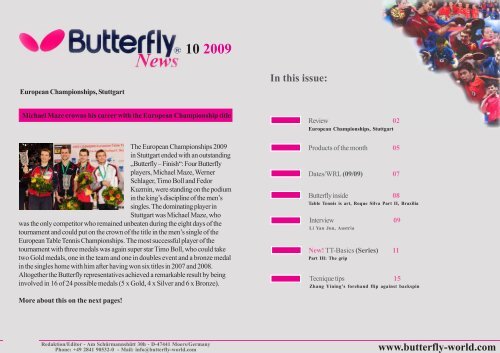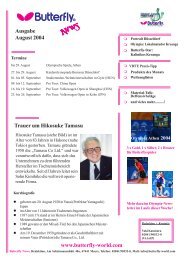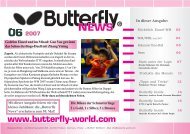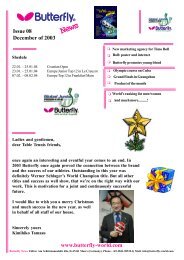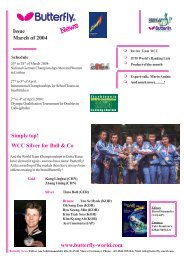You also want an ePaper? Increase the reach of your titles
YUMPU automatically turns print PDFs into web optimized ePapers that Google loves.
10 <strong>2009</strong><br />
European Championships, Stuttgart<br />
In this issue:<br />
Michael Maze crowns his career with the European Championship title<br />
The European Championships <strong>2009</strong><br />
in Stuttgart ended with an outstanding<br />
„Butterfly – Finish“: Four Butterfly<br />
players, Michael Maze, Werner<br />
Schlager, Timo Boll and Fedor<br />
Kuzmin, were standing on the podium<br />
in the king’s discipline of the men’s<br />
singles. The dominating player in<br />
Stuttgart was Michael Maze, who<br />
was the only competitor who remained unbeaten during the eight days of the<br />
tournament and could put on the crown of the title in the men’s single of the<br />
European Table Tennis Championships. The most successful player of the<br />
tournament with three medals was again super star Timo Boll, who could take<br />
two Gold medals, one in the team and one in doubles event and a bronze medal<br />
in the singles home with him after having won six titles in 2007 and 2008.<br />
Altogether the Butterfly representatives achieved a remarkable result by being<br />
involved in 16 of 24 possible medals (5 x Gold, 4 x Silver and 6 x Bronze).<br />
Review 02<br />
European Championships, Stuttgart<br />
Products of the month 05<br />
Dates/WRL (09/09) 07<br />
Butterfly inside 08<br />
Table Tennis is art, Roque Silva Part II, Brazilia<br />
Interview 09<br />
Li Yan Jun, Austria<br />
New! TT-Basics (Series) 11<br />
Part III: The grip<br />
Tecnique tips 15<br />
Zhang Yining’s forehand flip against backspin<br />
More about this on the next pages!<br />
Redaktion/Editor - Am Schürmannshütt 30h - D-47441 Moers/Germany<br />
10 <strong>2009</strong> Phone: +49 2841 90532-0 - Mail: info@butterfly-world.com<br />
www.butterfly-world.com
02 Review EC Stuttgart<br />
10 <strong>2009</strong> www.butterfly-world.com<br />
EC <strong>2009</strong>: Butterflies win 5 x Gold, 4 x Silver and 6 x Bronze<br />
in a special place in my apartment so that the memory of this great moment can<br />
build me up again after defeats in the future.“<br />
Michael Maze crowns his career with the European Championship title<br />
Michael Maze is known among the players<br />
and the fans as one of the coolest guys in<br />
every aspect. But on the 20 th of September<br />
the Nordic coldness disappeared and gave<br />
way twice to pure sentimentality. In front of<br />
6.000 spectators in the sold out Porsche<br />
Arena he first had a dramatic 4:3 victory in the<br />
semi - final against Germany’s defending title<br />
champion Timo Boll and the Scandinavian<br />
disappeared quickly after his triumph into the<br />
catacombs of the hall to let his tears run free.<br />
Three hours later Maze added the most<br />
important victory to his most emotional in his<br />
career: the victory in the final against Austria’s<br />
Ex World Champion Werner Schlager, who<br />
also was responsible for some tears of the<br />
new European Champion.<br />
After Maze won the European Top 12 in 2004 and the bronze medal at the<br />
WC in 2005, the Dane decorated himself for the first time in his career with the<br />
European title in the men’s single. The 28 year old who plays his topspins with<br />
Bryce Speed rubbers with a lot of rotation and pressure and places them with a<br />
lot of feeling, was beaming after his success: „Winning the EC title was a dream<br />
come true. I am proud and happy that I could keep up my level of play for<br />
eight days. I beat Timo Boll in the team event and the semi finals and in the final<br />
the former World Champion Werner Schlager.“ Maze continues:“ In Stuttgart<br />
you have seen the best Michael Maze of all times. The trophy will be standing<br />
Maze has planned his success at the EC strategically. In the group phase of the<br />
team event he did not play against Germany to spare himself for the more<br />
important phases of the tournament. His master plan worked: Maze reached<br />
the final with Denmark where he beat Timo Boll for the first time ever. Four<br />
days later he managed the same in the semi finals of the single competition.<br />
Germany’s world star Boll congratulated Maze: „Michael was the better player<br />
today, I must acknowledge that. Despite a close 4:3 victory he deserved to<br />
win. Being down 3:0 in the semi finals was just too much: to win four games in<br />
a row against a player at Michael’s level is very difficult.“<br />
Germany’s home favourite won the title in the team event and the men’s<br />
doubles (together with Christian Suess) like he did in the two previous years<br />
and was beaten only twice by Michael Maze and that although he only played<br />
his first official tournament since he was denied to play at the World Championships<br />
in Yokohama in <strong>2009</strong> because of injury. Boll: „I am happy that I worked<br />
on my physical strength together with my medical team. I am happy that I could<br />
play and hope that things will now steadily move upwards again.“<br />
Equally happy were the other medal winners in the men’s single. Finalist<br />
Werner Schlager, who managed to beat the number six of the world ranking list<br />
Vladimir Samsonov in the quarterfinals and missed his chance to win his first<br />
title as a European Champion, didn’t think of getting this far before the<br />
tournament: „This year my family and my son Nick, who was born in February<br />
came first. I had trained less and didn’t expect so much. From that point of<br />
view a silver medal is a huge success. Michael deserved to win the final. This<br />
time he was too speedy for me and he didn’t make any easy mistakes.“<br />
Maze, Schlager and Boll were among the few candidates who belonged to the<br />
circle of possible winners before the tournament which you can’t say about<br />
Fedor Kuzmin. The Russian („In the semi final against Werner I had my chance<br />
but didn’t use it. Altogether I am very satisfied with a bronze medal“) secured
03 Review EC Stuttgart<br />
10 <strong>2009</strong> www.butterfly-world.com<br />
his greatest success of his career by advancing to the semi finals. On the way<br />
there he beat the probably biggest surprise in the men’s event, the 21 year old<br />
German defender Ruwen Filus. The young Butterfly ace attracted attention<br />
before by impressive performances against Petr Korbel (Czech), Lucjan<br />
Blaszcyk (Poland) and Andrej Gacina (Croatia), while Kuzmin won among<br />
others against Belgium’s idol Jean-Michel Saive and the French Damien Eloi<br />
before he met Filus in the quarterfinal.<br />
In the women’s single the expections were not as high as in the men’s event.<br />
Here it was the defensive artist Viktoria Pavlovic who was the only Butterfly<br />
among the best four. She had to congratulate the later European Champion Wu<br />
Jiaduo (Germany) after the semi final. The player from White Russia said later:<br />
„It is a pity that I didn’t manage to move on to the final. After starting well in the<br />
seventh set I got mentally a bit tired.“ The biggest surprise in the women’s<br />
singles was the only 18 year old Ukrainian Margaryta Pesotska. The European<br />
Junior Champion surprisingly managed to advance to the final by winning against<br />
the title aspirants, Li Jie (Netherlands), Liu Jia (Austria) and Ruta Paskauskiene<br />
(Lithuania).<br />
The European Championships in Stuttgart were a success for the German host.<br />
46.000 tickets were sold announced the DTTB and additionally many hours of<br />
TV coverage on ZDF/ARD, Eurosport and the printing press. The enthusiastic<br />
spectators deserved a gold medal too because they provided a brilliant<br />
atmosphere for the EC in the Porsche Arena which encouraged the players to<br />
win medals.<br />
The Medal Winners<br />
(Butterfly players in bold)<br />
Men’s Single<br />
Gold: Michael Maze DEN<br />
Silver: Werner Schlager AUT<br />
Bronze: Timo Boll GER<br />
Bronze: Fedor Kuzmin RUS<br />
Women’s Single<br />
Gold: Wu Jiaduo GER<br />
Silver: Margareta Pesotska UKR<br />
Bronze: Viktoria Pavlovich BLR<br />
Bronze: Ruta Paskauskiene LTU<br />
Men’s Doubles<br />
Gold: Timo Boll GER/Christian Süß<br />
Silver: Lucjan Blaszczyk/Wang Zeng Yi POL<br />
Bronze: Aleksandra Karakasevic SBR/Bojan Tokic SVN<br />
Bronze: Damien Eloi/Emmanuel Lebesson FRA<br />
Women’s Doubles<br />
Gold: Daniela Dodean ROU/Elizabeta Samara ROU<br />
Silver: Nikoleta Stefanova ITA/Wenling Tan ITA<br />
Bronze: Zhenqi Barthel GER/Kristin Silbereisen GER<br />
Bronze: Ruta Paskauskiene LTU/Oksana Fadeeva RUS<br />
Men’s Team<br />
Gold: Germany (among others with Timo Boll, Bastian Steger)<br />
Silver: Denmark (among others with Michael Maze)<br />
Bronze: Austria (among others with Werner Schlager)<br />
Bronze: Romania<br />
Women’s Team<br />
Gold: Netherlands (among others with Linda Creemers, Carla Nouwen)<br />
Silver: Poland (among others with Natalia Partyka)<br />
Bronze: Croatia (among others with Tamara Boros, Andrea Bakula, Cornelia Vaida)<br />
Bronze: Czech (among others with Iveta Vacenovska, Renata Strbikova)
04 Review EC Stuttgart<br />
10 <strong>2009</strong> www.butterfly-world.com<br />
Short interview with the new European Champion Michael Maze<br />
„A dream came true“<br />
Michael, after winning the Europe Top 12 in 2004,<br />
Bronze at the WC 2005 and Olympic Silver in the<br />
doubles in Athens now the title of European Champion<br />
in the Singles. Is it a mistake or were you never<br />
before touched so emotionally before, after the match<br />
ball in the semi final?<br />
Maze: „That is true. By winning the title a<br />
dream came true for me. I beat Timo Boll twice<br />
and I have always lost to him before. Afterwards I also beat the Ex<br />
World Champion Werner Schlager. I feel great, simply great.“<br />
Not often did we see you so concentrated and so controlled like here at the EC<br />
in Stuttgart. On top of that you appeared to be very speedy and didn’t make a<br />
lot of easy mistakes…<br />
Maze: „I had a high quality in my game during all days of the<br />
tournament. I think that was the best Michael Maze of all times whom<br />
you saw this week. Surely the material of my sponsor helped me a lot.<br />
My Bryce Speed rubbers provide me with constant reliable quality as<br />
well with spin variations and the short – short play. That is really<br />
important, to have reliable material at all times under difficult conditions<br />
like the humid, hot air in the hall.“<br />
If that was the up to now best Maze whom the fans saw, what has changed in<br />
comparison to the time before?<br />
Maze: „I could really improve my fitness during the last 15 – 18<br />
months. This was the deciding factor in my game. I could finally move<br />
faster than Timo and win against him because of that. I could also<br />
overcome my long term problems with my back by this effective fitness<br />
training – the exercises during a long period of time paid off. My target<br />
is to improve even more so that I can move even faster so that I can<br />
also compete well on world level.“<br />
You didn’t only beat Timo Boll but you also beat 6.000 enthusiastic German<br />
spectators who really supported Timo after the 0:3 and pushed him to a 3:3.<br />
Were you impressed by that?<br />
Maze: „No, not at all, at least not negatively. It was great to play in<br />
front of so many fans. It is only normal that they supported Timo more<br />
than me. But it was a very fair and fantastic audience.“<br />
What are you going to do with your trophy, which you kissed so intensely at the<br />
victory ceremony?<br />
Maze: „The trophy will be standing at a special place in my apartment.<br />
If everything is not running so smoothly in sports and I must cope with<br />
defeats then I will look at it and remember this great moment at the EC<br />
in Stuttgart. This will surely build me up again. Life will go on.“
05 Products of the month<br />
10 <strong>2009</strong> www.butterfly-world.com<br />
Shoe Energyforce III<br />
The Specialist and the Perfectionists Produce Excellence<br />
Butterfly and ASICS are market leaders, both demand the very highest<br />
standards; together they have combined to manufacture the most advanced<br />
footwear available for the table tennis player. ENERGYFORCE III is the result;<br />
it is a shoe that provides support, aids footwork and possesses an attractive<br />
design. It is a shoe for high level performance made possible by the damping<br />
system ASICS Gel.<br />
ASICS Gel - a damping pulp, neither liquid nor solid, substantially reduces<br />
impact and thus reduces the strain on legs and joints.<br />
ENERGY FORCE III - High Performance for your feet!<br />
• Size (Asia): 22.5 - 29.0/30.0/31.0<br />
• Colour: white/grey (Size 22,5 - 31,0) - white/red (Size 22.5 - 25.0)<br />
• Weight: 230g (Size 27.5)<br />
RRP: 119,90 €<br />
At well assorted distributers!
06 Products of the month<br />
10 <strong>2009</strong> www.butterfly-world.com<br />
Radial EL<br />
This shoe provides comfort, stability and light weight. Its design enables the<br />
player to lace the shoe according to their personal preferences. Furthermore,<br />
the mesh inserts enable the foot to breathe.<br />
• Size (EU): 34 - 46<br />
• Colour: white/blue<br />
• Weight: 260g (Size 43)<br />
RRP: 54,90 €<br />
Shower sandals<br />
• PVC / EVA (Sohle)<br />
• Farbe: schwarz<br />
• Größe (EU): S (34-37), M (38-41), L (42-44), XL (45-47)<br />
RRP: 19,90 €<br />
At well assorted distributers!
07 Dates / WRL<br />
10 <strong>2009</strong> www.butterfly-world.com<br />
Dates<br />
ITTF World Ranking<br />
Mens -Septembre <strong>2009</strong><br />
9. October - 11. October <strong>2009</strong><br />
World Cup Women Guangzhou/China<br />
16. October - 18. October <strong>2009</strong><br />
World Cup Men Moskau/Russia<br />
22. October - 25. October <strong>2009</strong><br />
World Team Cup Linz/Austria<br />
Our Photo-Partners<br />
Manfred Schillings<br />
Imprint:<br />
Editor + Contact<br />
Yuki Kamizuru, 02841/90532-0<br />
No liability for possible errors and omissions.<br />
All prices are recommended retail prices.<br />
1 WANG Hao CHN<br />
2 MA Long CHN<br />
3 BOLL Timo GER<br />
4 MA Lin CHN<br />
5 WANG Liqin CHN<br />
6 SAMSONOV Vladimir BLR<br />
7 HAO Shuai CHN<br />
8 JOO Se Hyuk KOR<br />
9 Chen Qi CHN<br />
10 OH Sang Eun KOR<br />
11 MITZUTANI Jun JPN<br />
12 MAZE Michael DEN<br />
13 OVTCHAROV Dimitrij GER<br />
14 KREANGA Kalinikos GRE<br />
15 SCHLAGER Werner AUT<br />
ITTF World Ranking<br />
Women - Septembre <strong>2009</strong><br />
1 ZHANG Yining CHN<br />
2 GUO Yue CHN<br />
3 LI Xiaoxia CHN<br />
4 LIU Shiwen CHN<br />
5 GUO Yan CHN<br />
6 FENG Tianwei SIN<br />
7 WANG Nan CHN<br />
8 KIM Kyung Ah KOR<br />
9 JIANG Huajun HKG<br />
10 WANG Yue Gu SIN<br />
11 DING Ning CHN<br />
12 Li Jia Wei SIN<br />
13 TIE Yana HKG<br />
14 PARK Mi Young KOR<br />
15 LIU Jia AUT<br />
16 CHUAN Chih-Yuan TPE<br />
17 CHEUNG Yuk HKG<br />
18 RYU Seung Min KOR<br />
19 LI Ching HKG<br />
20 ZHANG Jike CHN<br />
21 PERSSON Jörgen, SWE<br />
22 PRIMORAC Zoran, HRV<br />
23 GAO Ning SIN<br />
24 JIANG Tianyi HKG<br />
25 CHEN Weixing, AUT<br />
26 YOSHIDA Kaii JAP<br />
27 SÜSS Christian GER<br />
28 TANG Peng HKG<br />
29 KO Lai Chak HKG<br />
30 YOON Jae Young KOR<br />
16 CAO Chen CHN<br />
17 DANG Ye Seo KOR<br />
18 FAN Ying CHN<br />
19 Li Jiao NED<br />
20 SUN Bei Bei SIN<br />
21 TOTH Krisztina HUN<br />
22 HIRANO Sayaka JPN<br />
23 FUKUHARA Ai JPN<br />
24 LI Qian POL<br />
25 LI Jie NED<br />
26 WU Jiaduo GER<br />
27 LIN Ling HKG<br />
28 PAVLOVICH Viktoria BLR<br />
29 GAO Jun USA<br />
30 YAO Yan CHN
08 Butterfly inside<br />
10 <strong>2009</strong> www.butterfly-world.com<br />
Much recognition for the project „Table Tennis is Art“<br />
We announced the art exhibition of the Brasilian artist<br />
Roque Silva in connection with the European Championships<br />
in Stuttgart in our September <strong>News</strong>letter and it was<br />
a well noticed success.<br />
At the eight days lasting picture gala in the area for<br />
honourable guests at the EC <strong>2009</strong> the surrealistic painter<br />
presented 14 fascinating works from the table tennis sport<br />
among them powerful expressionist pictures of the Butterfly stars Timo Boll,<br />
Werner Schlager and Zhang Yining as well as surrealistic pieces of art from the<br />
fifth biggest sport in the world. The colourful and for the first time published<br />
table tennis pictures earned a lot of recognition from the spectators as well as<br />
from the athletes like for example Timo Boll who got the opportunity as one of<br />
the first to see the art before the start of the exhibition: „The pictures are very<br />
nice and I like them“.<br />
„Timo Boll mit EM-Bild“<br />
„Zhang Yining“<br />
The artist, Roque Silva is clear about one thing: „The project with pictures from<br />
the area of the table tennis sport is going to be continued.“ More information<br />
about the project „Table Tennis is Art“ as well as the art of Roque Silva can be<br />
found in his virtual gallery ARTE BAHIA under the address www.artebahia.com.<br />
Contact person in Europe is Manfred Schillings who can be reached under the<br />
following mail address masch.photo@mail.com.<br />
„Duplo virtual“<br />
„Timo Boll“
10 <strong>2009</strong> www.butterfly-world.com<br />
09 Interview<br />
Liu Yan Jun, Austria<br />
The Chinese coach is chief of the players<br />
Liu Yan Jun has been in Europe for 22 years. He<br />
began in Austria and stayed in Austria. The Butterfly<br />
coach brought up women table tennis when he<br />
fetched two young Chinese players, Liu Jia and Li<br />
Quiangbing, from China and trained them here.<br />
Liu’s title of the European Champion in 2005 is proof<br />
of his good work. He collected title after title with his<br />
club Linz AG Forschberg and turned this club into by<br />
far the most successful women’s club in Austria. The<br />
victory of the players from Linz in the European<br />
Champions League during the last season is the<br />
highlight of his work. Despite all his successes Liu<br />
appears humble and looks quite critical at some<br />
developments. The absolute dominance of the Chinese<br />
women in world table tennis is dangerous from his<br />
point of view and may influence the interest in women table tennis world<br />
wide strongly. If the winner of the tournament is already decided<br />
beforehand who will be interested in it? The new cooperation project<br />
between China and the ETTU is designed to work against this. The Chinese<br />
has always advocated innovation.<br />
Mr Liu, you came from China. When did you come to Europe and how<br />
did your career start here?<br />
I played in Peking and came to Austria in1987 as a player. At first I played in a<br />
little club. When they couldn’t afford me any longer I moved to Linz and played<br />
there in the second division for three years. We got promoted to the first division<br />
and that was too much for me because I was working as a junior coach already.<br />
A year later I stopped as a player and concentrated fully on being a coach. I<br />
worked with the women from Linz AG Forschberg. We became winner of the<br />
European Champions League for the first time last season. Parallel I worked as<br />
a regional coach for upper Austria. In 1995 I worked with two players who<br />
managed to qualify for the European Junior Championships. That was a<br />
milestone and because of that I got an offer from the Austrian Table Tennis<br />
Association as a national coach for boys and girls. Just a year later the women<br />
national team needed a coach and I took the job, although the team was very<br />
weak at the time. We only took the 33 rd place at the WC 1997 in Birmingham.<br />
What did you do then?<br />
I thought on the one hand I had to do something very quickly and on the other<br />
hand I had to build up the younger players in the long term. That was when I<br />
fetched Liu Jia – we all call her „Susi“ in Austria – who was 14 years old from<br />
China. One year later she played her first European Championship in 1998 and<br />
won the title.<br />
Did Susi bring things forwards?<br />
Of course, everybody was just looking at her. At that time Werner Schlager and<br />
the double Schlager/Jindrak moved up. The highlight for Susi was the European<br />
title in the women’s single in 2005. That year I also fetched the young Li<br />
Quianbing to Austria. Last year we managed a very good 7 th place at the<br />
Olympic Games in Peking. That is the result of continuous work. We didn’t<br />
fetch strong old Chinese players like other European nations but young ones with<br />
whom we worked ourselves. That I want to stress. It’s a different way. Susi is<br />
fully accepted as an Austrian. We have a young team which has a lot of potential.<br />
Apart from your commitment for the national team did you continue to<br />
work for Linz?<br />
Yes, of course, without a break. When I came the team was number 3 in the<br />
„Staatsliga“. Then we became 11 times Austrian Champion successively and<br />
also won the super league with teams from Austria, Hungary, Czech, Slovakia<br />
a.s.o. six times. The title of the Champions League last season is the highlight. It<br />
was always my target that the national team is identical with the club team form<br />
Linz. Now Li has left the club which I am not at all happy about.<br />
What were your motives to go to Europe at a time when there were far<br />
less Chinese players in Europe?<br />
I was working in Peking as a coach at a sports school and worked a bit as a<br />
tourist guide. Therefore my English was quite good. These abilities – table tennis<br />
player and coach plus English – should be enough for a start in Europe. My<br />
estimations were right.<br />
At what level were you playing yourself and what were your coaching<br />
qualifications?<br />
As a player I was medium range, not a national player. You could say second<br />
division with little training. I don’t have any coaching qualifications but worked<br />
as a coach at a sports school and had a lot of experience. Generally the Chinese<br />
coaching education is very basic. If you have been a professional player you can<br />
become a coach at once. You only have to take an exam in theory and you can<br />
start at once.
10 Interview<br />
10 <strong>2009</strong> www.butterfly-world.com<br />
You are known as a women specialist. With the help of Liu and Li you<br />
strengthened the Austrian women national team. How do you look at the<br />
general problem of so many Chinese of all the different nations and<br />
clubs?<br />
I recognized that problem a long time ago. Therefore I fetched young players to<br />
build them up in a country for which they are going to play. In the case of Liu and<br />
Li it is like that, that they learnt the important basics in China but we made top<br />
players of them in Austria. At the World Cup 2007 in Chengdu 13 of the<br />
participants were born in China. Dodean and Boros had a wild card and<br />
Fukuhara was representing Japan. Without the two wild cards there would have<br />
been 15 Chinese. Even the African Champion, Yang Fen, is Chinese. When I<br />
asked her why she went there she answered because nobody could beat her<br />
there. No, no, that is the wrong way. At the time I told the Chinese head coach,<br />
Cai Xenhua that it couldn’t go on like that because otherwise there soon wouldn’t<br />
be any blond women with blue eyes in top table tennis any more. I proposed that<br />
the good young European girls should practice together with the Chinese A-<br />
Team. He liked the idea. The project failed initially because of a lack of money.<br />
But last year we managed the break through together with the ETTU. Two<br />
groups of altogether 16 players will take part in a training camp together with the<br />
Chinese national team in China and in Europe.<br />
Why are the Chinese so dominant in world table tennis?<br />
There are many reasons. The first one is the system. The children start at school<br />
when they are five to six years old. Each school has a school team. In each town<br />
and region, depending on size, there are two or three so called sports schools. I<br />
worked at ones of these. When they are seven years old the talented children are<br />
allowed to go to these schools. In the morning they go to lessons. In the<br />
afternoon and evening they practice under professional conditions. The children<br />
live there as well. In the whole of China there are 300 to 400 of such schools.<br />
Then you can easily work out the number of good players. The second reason is<br />
the competence of the coaches. All coaches are former professionals at a high<br />
level. The third reason is the selection. The highest sporting target of a table<br />
tennis player in China is to become world champion. They can only manage that<br />
if they get into the national squad and you need to be very good and must have<br />
extremely high stability and strength in competition. Naturally you must train hard,<br />
very hard and in general definitely a lot harder than in Europe. Only the strongest<br />
survive. There is an extreme competition situation which is a lot harder than in<br />
Europe. These are the main reasons for me why China is so dominating and has<br />
so many good players.<br />
Is it true that Chinese coaches have a completely different status with<br />
the players?<br />
Yes, of course. The Chinese coach is the boss of the players. The reason is<br />
obvious. They have so many good players. They have the choice. It goes that<br />
far that the media have to ask the coaches if they can interview one of their<br />
players and that although the Chinese top players are sport stars. This is<br />
completely different in Europe. The position of a coach is generally a lot weaker<br />
because the situation of competition is in many associations a lot lower.<br />
If you compare table tennis from 1987 with today what are the most<br />
basic changes?<br />
There is a lot but I would like to sum it up. It is more exciting, harder and faster<br />
and demands a lot more abilities of the players: speedy changes, tactical<br />
changes, high consistency with the strokes. That is absolutely necessary in<br />
games up to 11. The question arises of who makes fewer mistakes per game.<br />
Every point counts double in comparison to the former games up to 21. The<br />
difference between the great players and the good players has become less.<br />
More surprises are possible. The shorter games are a lot more interesting for the<br />
spectators. I think that the change in scoring eleven years ago made table tennis<br />
a lot more popular. Table tennis has never been as good as now. I think that also<br />
the table tennis manufacturers are profiting by that.<br />
What are your plans for the future?<br />
First of all I will concentrate on my job as national coach for women. Susi is<br />
now 27, Li is 23, and they build the young frame with perspective. Now it is<br />
important to me that we train up some Austrian girls so that they become a good<br />
number three, four or five. I hope that we can set up a bigger and stronger<br />
squad. A second target is promoting the Euro-China project with the women. I<br />
would like to include the home coaches of the players. In the long run I see good<br />
chances for this project.<br />
Is there something in table tennis what annoys you and what you would<br />
like to change?<br />
(He thinks for a while) No, nothing in particular.<br />
What is so fascinating about table tennis for you?<br />
I loved it already when I was a child and I still do. Therefore I love my job<br />
because I can do something what I really like.
11 TT-Basics<br />
10 <strong>2009</strong> www.butterfly-world.com<br />
Table tennis basics with Richard Prause<br />
Part III - the grip<br />
The German national coach<br />
Richard Prause is starting with a<br />
new series on practical aspects:<br />
Table Tennis Inside. He will try<br />
to give some useful tips which<br />
are easy to learn for all those<br />
players who are interested to<br />
improve their game. The former<br />
German national player has been<br />
working for the German Table<br />
Tennis Association as a national<br />
coach for ten years. Since 2004<br />
he has been head coach of the<br />
men’s team. Timo Boll is not only<br />
one of his players but he has also<br />
a close relationship to Germany’s<br />
and Europe’s number 1. In the third part of the new series Richard<br />
points out the important factors of how to hold the bat. Have fun with<br />
Richard Prause and his advice. If you have any questions or wishes,<br />
please send us a mail. We are looking forward to it.<br />
About the „correct“, „wrong“ thumb and index finger<br />
The nice thing about table tennis is that there is nothing which is correct and<br />
nothing which is completely wrong. Only one thing is important that you have<br />
the means to execute all stroke techniques optimally so that they don’t limit<br />
your possibilities in the end. The same applies for the grip. There is no right or<br />
wrong grip. But there are grips which limit the efficiency and execution of<br />
certain techniques. These are not advisable of course. There are a number of<br />
top players who prefer a grip with disadvantages and still got very far. The<br />
reason for that is that the disadvantageous grip still gives them an advantage.<br />
Let’s for example take the low grip of the French player Patrick Chila.
12 TT-Basics<br />
10 <strong>2009</strong> www.butterfly-world.com<br />
Picture 7a shows the neutral grip. On picture 7b you can see the difference: he<br />
holds the grip of the bat clearly lower. This kind of grip is very good for a flip<br />
but causes problems for controlled blocking.<br />
Another Frenchman the Butterfly player Christophe Legout, takes a second<br />
finger onto the backhand side (pictures 8a and b). The second finger on the<br />
bat surface makes a backhand topspin very difficult because the rotation of the<br />
wrist for a backhand topspin is almost impossible because of the tension of the<br />
ligaments in both fingers. On the other hand this grip is an advantage for the<br />
forehand because you can develop a lot of pressure and feeling. These are only<br />
two examples for individual deviations which you can see even more in the<br />
lower divisions. Generally I would not advise different grips because they<br />
usually have more disadvantages than advantages.
13 TT-Basics<br />
10 <strong>2009</strong> www.butterfly-world.com<br />
Where should the thumb be on the forehand side and what role does the position of the thumb play?<br />
The thumb is very important. It creates the pressure point which influences the backhand game. By pressing the thumb down you can create additional swing for the backhand<br />
and close the bat easier (picture 9a). In the end the position of the thumb is very individual. Players, who prefer to play with their forehand have the thumb either not at all or<br />
only very little on the surface of the bat (Picture 9b). Players, who are more dominant on their backhand, like to take the thumb on the bat to execute the backhand in a<br />
better way (picture 9c). Therefore you can observe a changing position of the thumb when playing backhand and forehand.
14 Technique tips<br />
10 <strong>2009</strong> www.butterfly-world.com<br />
Where should the index finger be for the backhand and how much deviation is possible?<br />
The index finger should be on the rubber and stabilize the movement of a stroke as an opposite pressure point to the thumb. Picture 10a shows the optimal position. The<br />
finger should not slip too far down (picture 10b) or too far up to the middle of the bat (picture 10c).
15 Technique tips<br />
10 <strong>2009</strong> www.butterfly-world.com<br />
Flip variations from previous Butterfly <strong>News</strong> issues:<br />
Backhand Chiquita flip (Korbel) 8 + 9/2006<br />
Backhand flip (Schlager) 3/2008<br />
Forehand flip against topspin (Kurashima) 5/2008<br />
Backhand flip from push (Matsudaira) 9/2008<br />
Starting phase – pictures 1.5: From the basic position with parallel feet<br />
(picture 1) Yining moves into position for the stroke.<br />
Zhang Yining’s forehand flip against backspin<br />
The Chinese Butterfly player is after the last single World Championships the<br />
undoubted number 1 of the world and one of the most successful players ever.<br />
Also from the technical point of view she plays like from a book which you can’t<br />
say about every top player. We could admire her perfection already in quite a<br />
few Butterfly <strong>News</strong> issues. She demonstrated the counter hit with her backhand<br />
(7+8/2008), with her forehand (4/2008), the forehand topspin from an extreme<br />
starting position (11+12/08) and the backhand push (12/06) in an impressive<br />
manner. Now in the current October issue she shows us the forehand flip against<br />
backspin or sidespin balls.<br />
It becomes clear again that the flip basically is a mini topspin played with the<br />
wrist and the forearm. If you understand this principle it is a lot easier to learn or<br />
improve the flip. Often the imagination about the exact movement for a flip<br />
differs. Obviously there are different varieties depending on the spin of the<br />
coming ball, the placement, the height of the flight path and where you want to<br />
place the ball. We have already reported about several varieties (see box<br />
above). But the mini topspin movement as the basic movement remains. An<br />
exception is the smash flip against too high returns which is hit with the<br />
movement of wrist and forearm. Here the ball is hit more centrally. Let’s now<br />
have a closer look at Zhang Yining’s forehand flip.
16 Technique tips<br />
10 <strong>2009</strong> www.butterfly-world.com<br />
On picture 3 we can see how she lifts her right foot and simultaneously moves her playing arm from the neutral position to the forehand side. On picture 4 she lifts the slightly<br />
opened bat; the playing arm is bent at the elbow and taken further to the forehand side. The right foot is lifted and overtakes the left foot.
17 Technique tips<br />
10 <strong>2009</strong> www.butterfly-world.com<br />
On picture 5 Yining is in the position to execute the flip. The right foot is now far ahead and just before reaching the floor. When she makes contact with the ball Yining needs<br />
to have contact with the floor otherwise she wouldn’t be able to play the dynamic flip. The playing arm is stretched at the elbow (but not completely see picture NO2). That<br />
way the forearm is more movable and can execute the following bending of the forearm more speedily. The shoulder and the prolonged playing arm build an axis (see yellow<br />
dotted line). The bat is straight and points to the side. For this Yining has to turn her wrist outwards and creates an optimal tension for executing the flip extremely fast.<br />
Main phase – pictures 6-8: If we compare picture 5 with picture 6 it becomes clear that her body weight is on her forward right foot so that Yining has a good balance.<br />
The slightly close bat angle shows us that the stroke has begun. The ball is hit at the highest point but not too early because the ball still has too much spin and the flight can’t<br />
be estimated accurately. The main impulse of the stroke comes from the wrist which has to be coordinated with the forearm. The movement of the stroke is upwards.
18 Technique tips<br />
10 <strong>2009</strong> www.butterfly-world.com<br />
On picture 7 and 8 it becomes very clear how the upper body supports the stroke by turning inwards. Additionally picture 8 shows us how low down she went because at<br />
the end of the stroke she is at the lowest point.
19 Technique tips<br />
10 <strong>2009</strong> www.butterfly-world.com<br />
Yining also shows us two common mistakes.<br />
Mistake NO1: The player goes into the right position but the upper body remains too straight towards the table and doesn’t move towards the ball. Therefore the bat is too<br />
far back.<br />
Mistake NO2: The player has stretched the playing arm too far forward. Therefore she is not above the ball and can’t control it well enough. Apart from that the playing arm<br />
is stretched too much in this position.


